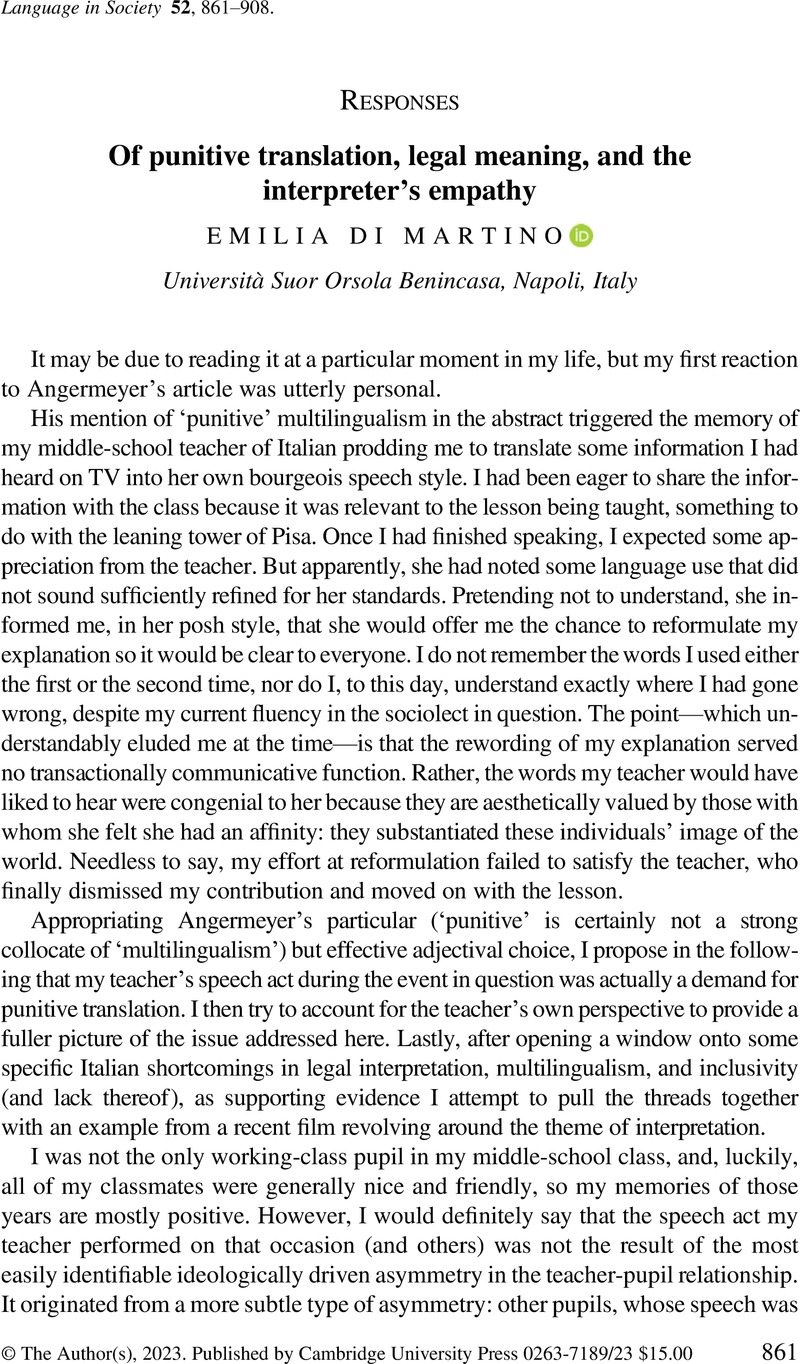No CrossRef data available.
Article contents
Of punitive translation, legal meaning, and the interpreter's empathy
Published online by Cambridge University Press: 01 December 2023
Abstract
An abstract is not available for this content so a preview has been provided. Please use the Get access link above for information on how to access this content.

- Type
- Response
- Information
- Copyright
- Copyright © The Author(s), 2023. Published by Cambridge University Press
References
Apicella, Teresa (2017). L'interprete di dialetto al tribunale di Macerata, sulsud.it, 14 August. Online: https://sulsud.it/lingua-napoletana-linterprete-di-dialetto-al-tribunale-di-macerata-intervista-con-lavvocato-e-attore-andrea-di-buono/.Google Scholar
Canestrini, Nicola (2019). Il diritto all'assistenza linguistica adeguata per l'indagato alloglotta nell'ordinamento italiano, Giurisprudenza Penale Web, 2–14 February. Online: http://www.giurisprudenzapenale.com/wp-content/uploads/2019/02/Canestrini_gp_2019_2.pdf.Google Scholar
Di Martino, Emilia (2019). Audiovisual translation from criticism to popularisation. Cultus 12:88–105.Google Scholar
Falbo, Caterina (2013). La comunicazione interlinguistica in ambito giuridico. Trieste: EUT. Online: https://eut.units.it/it/catalogo/la-comunicazione-interlinguistica-in-ambito-giuridico-temi-problemi-e-prospettive-di-ricerca/582.Google Scholar
Garwood, Christopher John (2012). Court interpreting in Italy: The daily violation of a fundamental human right. The Interpreters’ Newsletter 17:173–89. Online: https://core.ac.uk/download/pdf/41176938.pdf.Google Scholar
Greselin, Federico (2015). Ma come parlano questi? In Greselin, Federico (ed.), Lingua cinese: variazioni sul tema, 173–90. Venezia: Ca Foscari. Online: https://edizionicafoscari.unive.it/it/edizioni/libri/978-88-6969-042-6/.Google Scholar
Hale, Sandra; Ozolins, Uldis; & Stern, Ludmila (eds.) (2009). The critical link 5: Quality in interpreting–A shared responsibility. Amsterdam: John Benjamins.CrossRefGoogle Scholar
Heath, Shirley Brice (1983). Ways with words: Language, life and work in communities and classrooms. Cambridge: Cambridge University Press.CrossRefGoogle Scholar
Lee, Jieun (2009). Conflicting views on court interpreting. Interpreting 11(1):35–56.CrossRefGoogle Scholar
Marazzini, Claudio (2017). Il napoletano in tribunale con l'interprete, e i piemontesi a Napoli con l'italiano. accademiadellacrusca.it, 25 July. Online: https://accademiadellacrusca.it/it/contenuti/il-napoletano-in-tribunale-con-linterprete-e-i-piemontesi-a-napoli-con-litaliano/7414.Google Scholar
Michaels, Sarah (1981). Sharing time: Children's narrative styles and differential access to literacy. Language in Society 10(3):423–42.CrossRefGoogle Scholar
Senatore, Alessandro (2017). Macerata, imputati napoletani non capiscono l'italiano e chiedono il traduttore. CorrieredelMezzogiorno.it, 13 July. Online: https://corrieredelmezzogiorno.corriere.it/napoli/cronaca/17_luglio_13/macerata-imputati-napoletani-non-capiscono-l-italiano-chiedono-traduttore-26ea88e0-67a8-11e7-ac90-09bc279dcc97.shtml.Google Scholar
Silverstein, Michael (2003a). Indexical order and the dialectics of sociolinguistic life. Language & Communication 23:193–229.CrossRefGoogle Scholar
Silverstein, Michael (2003b). Translation, transduction, transformation. In Rubel, Paula G. & Rosman, Abraham (eds.), Translating cultures, 75–108. Oxford: Berg.Google Scholar
Silverstein, Michael (2017). Standards, styles, and signs of the social self. Journal of the Anthropological Society of Oxford 9(1):134–64.Google Scholar
Vannoni, Mario (2020). L'arrivo di Wang. themacguffin.it, 3 November. Online: https://www.themacguffin.it/larrivo-di-wang-discorso-sulla-xenofobia-interplanetaria/.Google Scholar



